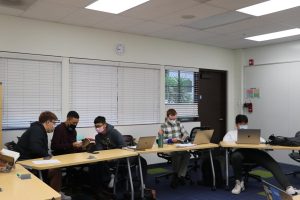A WSC Core Class, Taya Sibichenkova
February 9, 2022
On Wednesday, January 19th, I went into Dr. Hartle’s F block American Idea class, with the intention of listening to some of my peers from WSC discuss a book that the entire sophomore class was reading.
The topic of the day’s discussion would be a part of Kate Chopin’s The Awakening, a classic novel published in 1899, which is considered an “early vision of women’s emancipation.” I had attended an earlier block of this same class with Dr. Hartle the week before, so I assumed the discussion would follow a similar path.
However, I was very surprised by the fact that the WSC sophomores did not have much to say about the book, or on the topic of discussion in general. Dr. Hartle asked the class at the beginning of the block what they thought about the reading that was assigned for homework, and to me it seemed that the class took a surprisingly long time to respond. It was especially surprising in comparison to my own Society and Idea classes, where more often than not, my class would have a lively discussion until we were interrupted by our teacher.
As the class continued through choppy conversation, I realized that certain questions from Dr. Hartle elicited a stronger reaction from my WSC peers than others, even if only two or three of the same people responded each time.
Moreover, there seemed to be a few people that spoke for the majority of the discussion, not leaving much room for others to add constructive points. It felt very much “everyone for themselves”, where even though everyone was physically present in the classroom, nobody was really following a particular thread in the discussion. I was also surprised at how passively a lot of students responded to Dr. Hartle’s questions, since I came in with the assumption that WSC students would be more opinionated or argumentative.
I remembered something that Mr. Hoe had told me when I spoke with him about Webb’s unique (partly) co-ed program. He explained to me why Webb decided to only segregate classes for underclassmen, and what research Webb relied on to create their split academic program.
“In general, students who identify as female are more intellectually mature at a younger age,” Mr. Hoe said, “At least, that’s what the national data says.”
At first, I took this information with a grain of salt, as I assumed that the “national data” could very possibly be outdated and already be replaced by newer, more accurate studies. However, the longer I sat in Dr. Hartle’s class, the more I realized that there were clearly differences between the VWS and WSC classes, both in our academic interactions and thought processes. The real question is whether these differences ultimately lead to a constructive academic learning experience for everyone.


